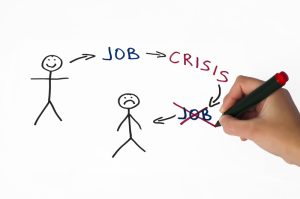Losing a job is a loss. It has many elements that lead to grief, sadness, loss of identity, pride and numerous secondary financial implications. One can lose a sense of hope when one loses the financial security a good job provides and lead one into despair and poor coping. It is important, as in any loss, to maintain good coping strategies and remain optimistic and confident in one self. One needs to find the ability, despite the pain, fear and grief, to proceed forward with courage and optimism to find a new job.

The article, “Job loss, grief and professional identity” by Mark Carey takes a closer look at the implications surrounding job loss. He notes the initial shock and anger associated with it but also pushes the reader to find hope and cope in healthy ways to find a new job. He does not dismiss the pain or secondary issues surrounding job loss, but looks to provide some guidance in better responding to the loss itself. He states,
“Losing a job can also become an unforeseen positive transformation and I have seen clients over the years pivot successfully without losing a sense of self-identity. Many clients do not buy into the idea that their job is who they are. These clients transition between jobs without falling apart and making huge leaps forward in a way thought impossible before the termination. One door closes and another opens. I have to say that most clients I have worked with actually find better paying and more personally satisfying jobs after being terminated or laid off.”
“Job loss, grief and professional identity”. Carey, M. (2023). Westfair Business Journal. Access here
Commentary
Job loss involves numerous losses. Albeit many of them do not need to define one or prevent one from reaching even better positions with other employers. Still, the loss for some can be very overbearing. One element is sense of self. Some individuals, who even retire, have the issue of not knowing who they are outside their profession. A life long cop may have issues retiring or being let go. Likewise, helping professions and skilled laborers who are defined by these professional talents may feel they no longer matter without those positions or responsibilities. While a career plays a big role in what we do and love, we cannot equate a job identically to oneself. Individuals are more than what they do and it is important to understand that. Also, there are transitions in life, when one position in life transitions into another and while our positions change, we still remain ourselves. They are accidental qualities. While some positions in life mean more than others, we are still simply us. It is important during job loss, retirement, or transition, that we are more than what we do, even if what we do matters alot.

Beyond loss of identity, many individuals also suffer from change itself. The change of finding a new place to work. The change of new co-workers. The change of new work schedules or new training skills. Others have a difficulty emotionally. Maybe they feel betrayed, or upset over the termination. Maybe they feel angry over the job loss. During the transition, negative emotions may limit their ability to cope and lead to a down time of bad decisions involving drugs, or excessive sleep. Individuals may let themselves physically and mentally lose focus and neglect their physical and mental health.
Still others may be haunted by the financial and secondary losses of job loss. The worry of rent, or house payments, or car payments, or basic utilities. They may worry over the loss of certain life styles, or even the fear of caring for their family and children. Some children may need healthcare or need funds for school. These worries become very real very fast when a financial line is suddenly cut.
Coping through Job Loss
While job loss presents so many issues as noted above, individuals can still proceed forward and find new employment. Skilled workers rarely remain unemployed and unskilled workers can still find supplemental jobs that may not be as good but may fill the gap till a better job comes along. Individuals need to remain in contact with family and friends and utilize their support system to maintain confidence and self esteem. They should work on building a resume and preparing for job interviews. With optimism, energy should be put into a job search.

In addition, the individual should maintain mental and physical care of oneself. Self care is key during this period. Exercise and gym are pivotal to maintaining the schedule one once had. Bad habits can easily creep into life and derail an individuals hard work ethic. There are sometimes some good at that can come out of it. Sometimes, it opens doors to a better job and sometimes it also gives one time, especially if laid off, to find a little bit of rest for a short period of time. Try to find positives while finding a new job.
For those retiring, it may be good to look maybe to a hobby or finding volunteer work that can fill the void. Those in human service rarely are able to stop helping people and many who retire eventually doing side projects and volunteer work. Others should take the time to enjoy family and vacation or at least a new hobby.
Some may not cope well and feel depressed or even enter into depression. If so, one should seek help from a licensed professional counselor with emphasis in grief counseling to help one through the dark period of time.
Conclusion
Job loss or retirement is a transition or change. As a change it can cause grief and distress. It is clearly a loss because it takes something away. It can take away self image, or self value, but it can also take away life style by limiting one’s financial or social status. While a job is not who one is, it very much plays a big role in what one does and is able to do in life. It plays a large role in a person’s sense of purpose.

Please also review AIHCP’s Grief Counseling Certification and see if it matches your academic and professional goals. The program is online and independent study and open to qualified professionals seeking a four year certification in Grief Counseling.
Additional Resources
“Job Loss and the Stages of Grief: Coping and Recovering”. McLaren, P. (2020). PsychReg. Access here
“The 5 Stages of Grief After a Loss”. Health Essentials. (2022). Cleveland Clinic. Access here
“How to Handle Being Laid Off”. Smith, L. (2021). WebMed. Access here
“How to Support Clients With Job Loss Depression & Stress”. Latif, S. (2022). Positive Psychology. Access here
